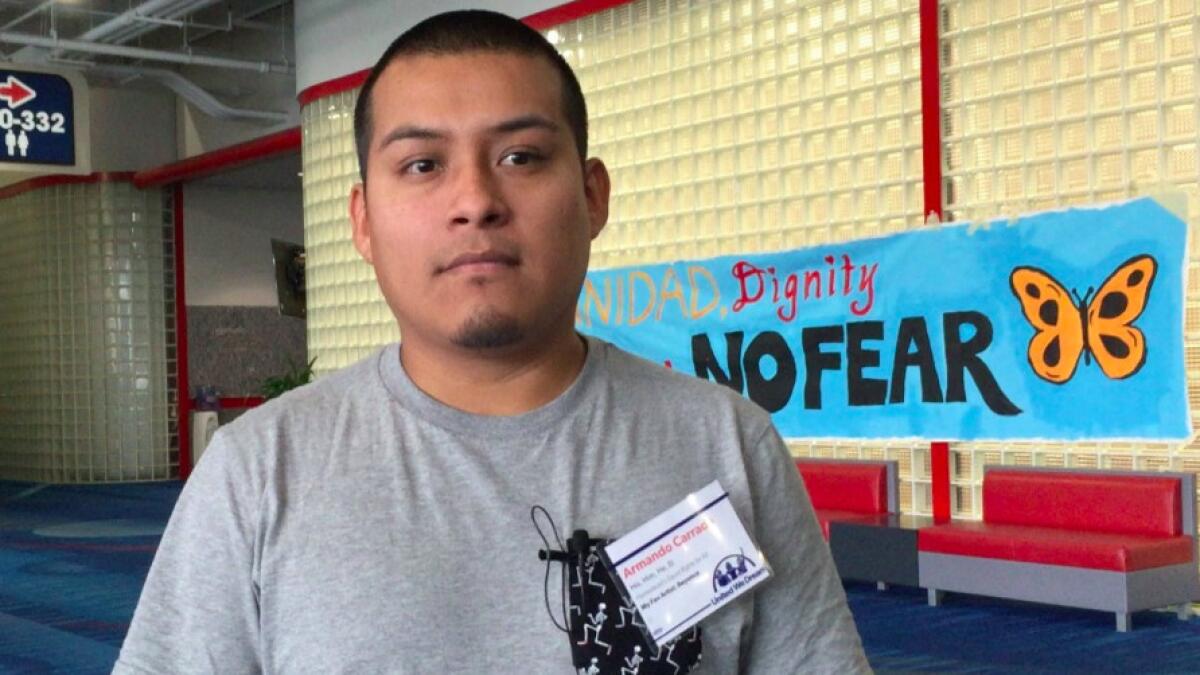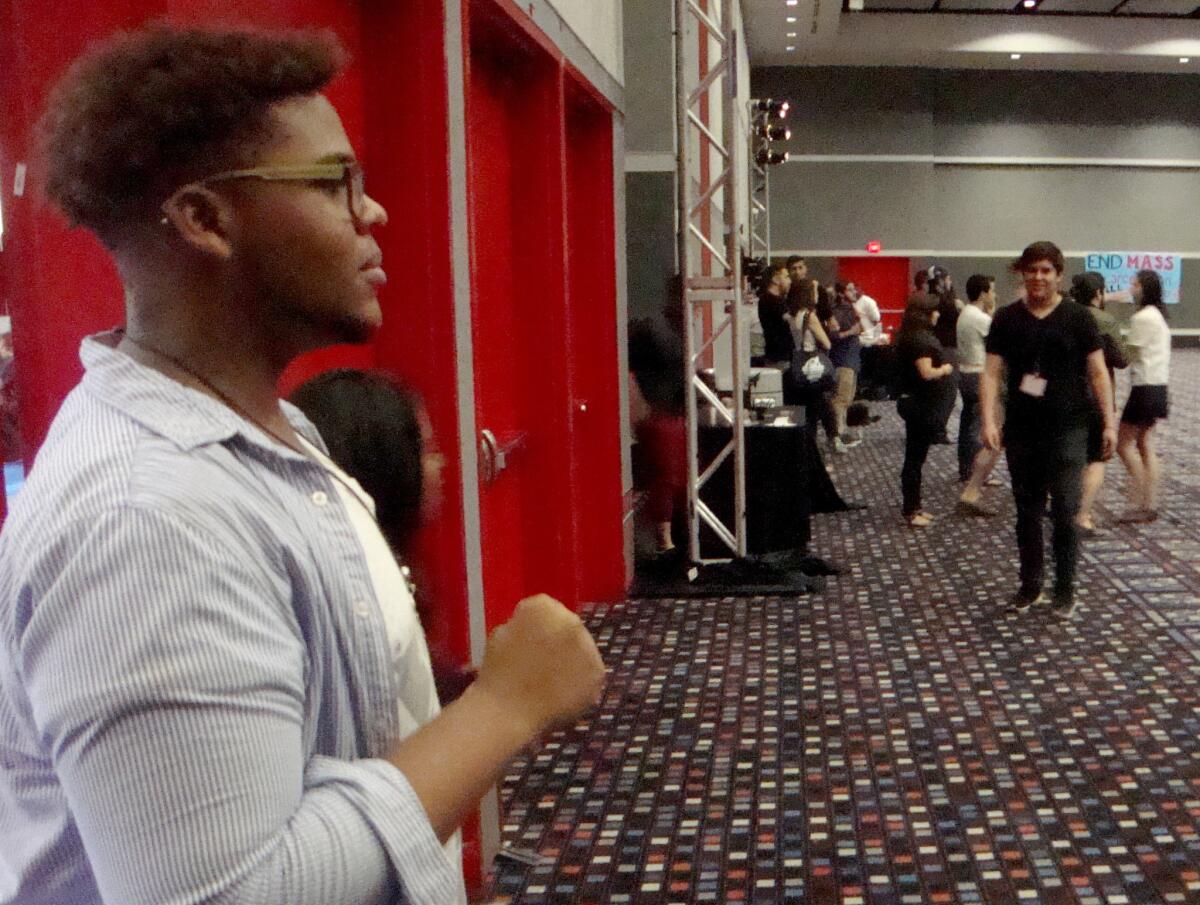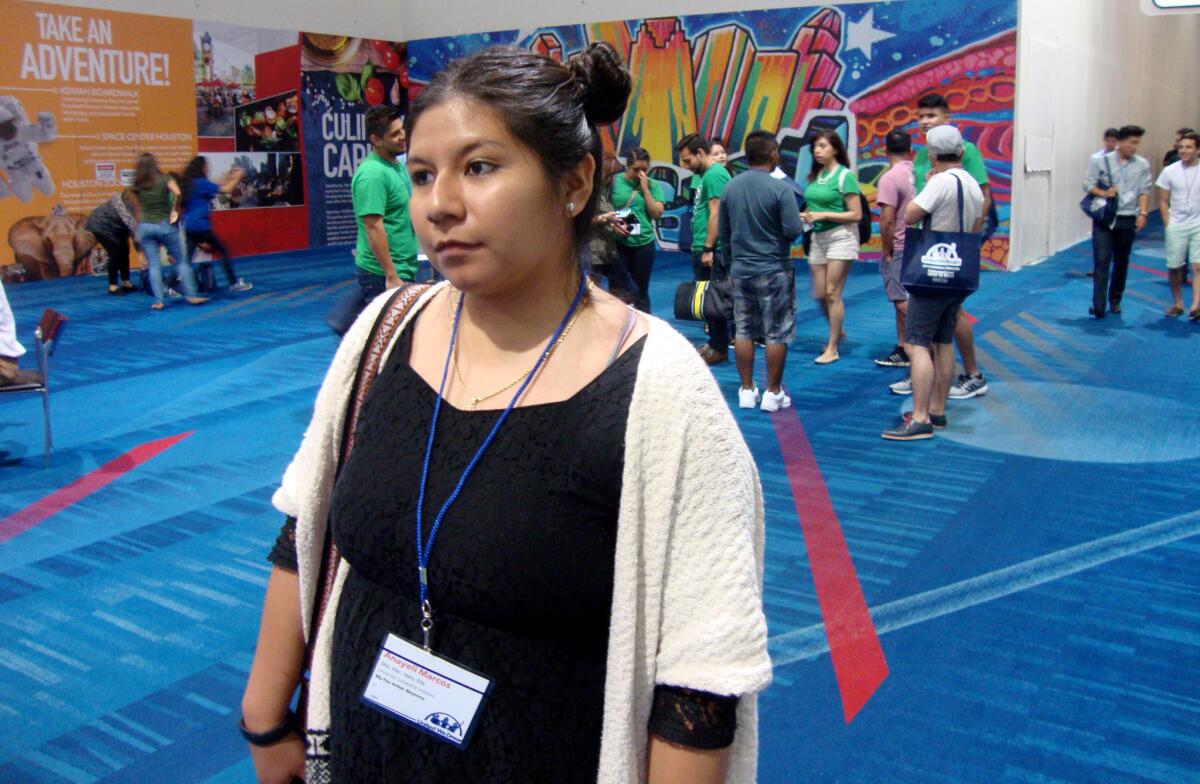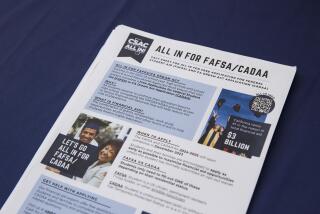The ‘Dreamers’ Obama spared from deportation: What are they dreaming about?
- Share via
Reporting from Houston — They were born in another country but raised in this one, and that has made them culturally, linguistically – but not legally – American.
When President Obama used executive action to create the Deferred Action for Childhood Arrivals, or DACA, program four years ago, this was the group he was seeking to protect. They were, for the most part, children whose parents came to this country illegally, and either brought them along or sent for them later. Many had no recollection of their home country, spoke English, and argued that they should be given the rights and privileges of the only country they really knew, including temporary two-year work permits.
Conservatives argued that Obama had overstepped the bounds of executive power and had infringed on states’ rights. They objected to the idea of rewarding families who were, no matter how talented or well-meaning, in blatant violation of immigration law.
Now the Supreme Court is considering arguments by Texas and 25 other states that sued to block Obama’s decision in 2014 to extend the program and add a new one called Deferred Action for Parents of Americans and Lawful Permanent Residents, or DAPA, offering three-year work permits to parents of citizens and other legal residents. The high court could rule as soon as this week.

They’re often called “Dreamers” -- people who came to the U.S. illegally when they were young -- and more than 1,000 gathered recently at the United We Dream Congress in Houston to organize and share their stories.
While the ruling is not expected to directly affect original deferred action recipients, many nevertheless worry that it could. Many also have family and friends who could be hurt if the court overturns the extended deferred action for young immigrants or the parents’ program.
Earlier this month, about 900 people from across the country gathered in Houston for the annual United We Dream congress on the anniversary of the creation of the Deferred Action for Childhood Arrivals program, many of them participants. We spoke with some of them about what’s at stake in the high court’s ruling.

Armando Carrada, 26, Homestead, Fla.
His mother brought him to the U.S. illegally from Oaxaca, Mexico, when he was 7. His stepfather worked the fields, and his mother worked at a local garden nursery where he and his younger sister later found summer work.
“That taught us not to end up there,” Carrada said.
After graduating from high school, Carrada wanted to attend a state university to prepare for a career in the tourism industry, but couldn’t afford it without in-state tuition. He considered returning to Mexico for college, but decided against it.
“In Mexico I don’t have the opportunities I have here,” he said.
When he heard about the deferred action program, he was scared to apply. “At first, I’m thinking these people are crazy – I’m going to get arrested,” he said.
His mother, who completed only a few years of elementary school in Mexico, encouraged him to attend an informational meeting, where Carrada said he gained new hope. He and his sister paid a lawyer $5,000 each to apply, unaware that they could have handled the application themselves.
“I literally wasted all my savings on that. I went broke,” he said.
He received the protection of the deferred action program, which allowed him to get a driver’s license and pay in-state tuition at Miami Dade College, where he just received his associate’s degree in travel and tourism administration. Next year, he plans to attend Florida International University in the same field, also with in-state tuition, a third of what out-of-state students (and those not in the deferred action program) pay.
See the most-read stories this hour >>
His mother had planned to apply for Deferred Action for Parents, which would have allowed her to get a driver’s license. Instead, she relies on a cousin, who is also in the country illegally and doesn’t qualify for the program.
Last year, immigration officials came to the home she shares with Carrada and his two younger sisters, the youngest a citizen.
“My mom thought it was the plumbers, and they just rushed in,” Carrada said.
Officials were looking for a family friend who had not stayed at the house in years, Carrada said. None of them were detained, but they were shaken.
“Her hopes are down,” he said of his mother. “She says, ‘You guys are building your lives, but that can be taken away at any time.’”
On his way to the United We Dream conference, Carrada was stopped at the Miami airport for added screening because his license is temporary. He tried to explain, but officials didn’t understand at first.
“They don’t know what it is, DACA,” he said. They eventually let him board his flight.
While the Supreme Court case is not supposed to involve original deferred action recipients, Carrada said, he and others have become worried as the case has dragged on. Last year, 108,000 recipients granted three-year work permit renewals saw them challenged by a federal judge in Texas. As part of the case, the judge later demanded identifying information about those who received the permits.
That has left those who received deferred action status especially nervous.
“With what’s going on right now,” Carrada said, “you really don’t know.”

Gregory “Ronnie” James, 18, Brooklyn, N.Y.
James was 9 when his mother – who had stayed in the U.S. illegally, working as a babysitter – sent for him and his older brother.
Fascinated by airplanes, he still remembers that first trip from his Caribbean island home of St. Lucia to the U.S., how awed he was to see the glow of American cities from the sky at night.
In New York, James attended Aviation High School in Long Island City, where students can study to receive a license in aviation maintenance – unless they’re in the country illegally. James didn’t qualify.
When his mother heard about Deferred Action for Childhood Arrivals in 2012, she urged him and his brother, then 20, to apply. “Now my brother and I could get jobs that allowed us to help with the bills,” he said.
After they received deferred action status, his brother found work as a security guard, then as a nursing assistant.
This spring, James enrolled at the Borough of Manhattan Community College in a two-year associate’s program in communications, and plans to work in aviation management.
“Now I can use my degree for its purpose,” he said.
James worries that if the court rules against the programs, it could erode the original protections.
“It would mean when I finish my degree I won’t be able to use it. It will just be a piece of paper,” he said. “It would mean the security I’ve had these past years is gone.”

Eunsoo Jeong, 28, Los Angeles
“DACA was very, very lucky timing for me,” said Jeong.
When the program was announced, she was a senior at San Jose State University. By the time she applied, she was an unpaid intern at a Burbank animation company that wanted to hire her, but couldn’t unless she had legal status.
Deferred Action for Childhood Arrivals solved the problem.
“If I didn’t have DACA, I don’t think I would have been able to get the job,” Jeong said.
Jeong’s mother had sent her from South Korea to live with her grandmother in San Francisco when she was 13. She traveled with a tourist visa and overstayed. Three years later, her single mother also came to the U.S. for a time to study and work three jobs. They shared a single room at Jeong’s aunt’s place.
“It was rough. Because we didn’t have papers, we couldn’t find an apartment to move out,” Jeong recalled.
She tried to find scholarships to art colleges, but could not find anything she qualified for without legal status. With help from a high school art teacher, she held a showing of her drawings before she graduated and raised money to pay her in-state tuition at San Jose State.
For years she worked off the books, first gardening, moving and making deliveries, then at the tourist shops on Pier 39 and Fisherman’s Wharf, becoming a server during college.
When she was 19, her mother returned to South Korea after her visa expired. Jeong bounced around, staying with relatives and eventually in her high school boyfriend’s garage.
She remembers thinking at the time: “Maybe this is it. Maybe this is how far I can go.”
“If DACA didn’t go forward, that’s how it would have been,” she said.
Some relatives who came to the U.S. legally and other Korean Americans were not supportive, she said. It took her years to talk about her immigration status without crying, and to seek out help.
“A lot of people think the subject is really heavy and don’t want to talk about it,” Jeong said. “If I wasn’t an illegal immigrant myself, I would never have cared about the issue.”
She has had a boyfriend for two years who is a U.S. citizen. Co-workers say she should just get married, get legal status and stay home. But Jeong said for her and others, the right to work and support themselves regardless of who they marry is important, and deferred action is “a bigger issue than just one person getting their status fixed.”
She came to the United We Dream conference to learn more about deferred action and “meet people who have similar struggles.”
Her former professors at San Jose State have been sending immigrant students with questions about their status to her for advice. Jeong said she wants to educate herself to be a resource for them, “because I didn’t have that person when I was going through it.”

Anayeli Marcos, 22, Austin, Texas
When Marcos heard her home state was suing the federal government to block deferred action, she wasn’t surprised, but she was disappointed.
“I wanted my parents to have the same thing I have,” Marcos said.
Her mother brought her from Guerrero, Mexico, to Houston when she was 6 to meet her father for the first time. He worked construction, while her mother cleaned houses. Now she has three younger siblings, all U.S. citizens born here.
Marcos has been working to put herself through school at the University of Texas at Austin, where she graduated this spring and enrolled in graduate school for social work and Latin American studies.
It took her two years and help from a friend’s online fundraising to save the $465 application fee for DACA. Once she received it, she got a driver’s license and jobs as a professor’s research assistant and as a Spanish interpreter for counselors.
But she worries what will become of the deferred action program.
Marcos’ boyfriend lives in Pennsylvania, and traveling without deferred action status would be difficult for her. This spring, she flew to El Paso for a research trip with the professor she has been assisting, only to be stopped by a Border Patrol agent at the airport. It was a frightening moment, although fear soon gave way to relief.
“He saw my DACA [permit] and that I was allowed to be in the U.S. and he said I was good to go,” Marcos said.
Then in April, during finals, her status expired. When Marcos tried to renew it with U.S. Customs and Immigration Services, she faced repeated delays.
“It was taking an extremely long time and both of my jobs were telling me I had to stop working, but whenever I had my work permit, I could come back,” she said.
Marcos filed a complaint with the agency online, and in less than two weeks, they approved her renewal.
She said even original participants should be thinking about what they will do if the high court rules against the program. Last summer, she volunteered to visit immigrant women who had entered the U.S. illegally and were detained at a federal detention center in Texas, some of whom were later deported back to Central America.
“It’s always been a risk,” she said of deferred action. “Now that they have our information, they know where we live. They always want to know when we change addresses … It’s good to stay hopeful, but in reality, we have to stay prepared.”
ALSO
Supreme Court to decide if people awaiting deportation have a right to release on bond
Frustrated by new U.S. program to take in migrants, Central American parents turn to smugglers
More to Read
Sign up for Essential California
The most important California stories and recommendations in your inbox every morning.
You may occasionally receive promotional content from the Los Angeles Times.











